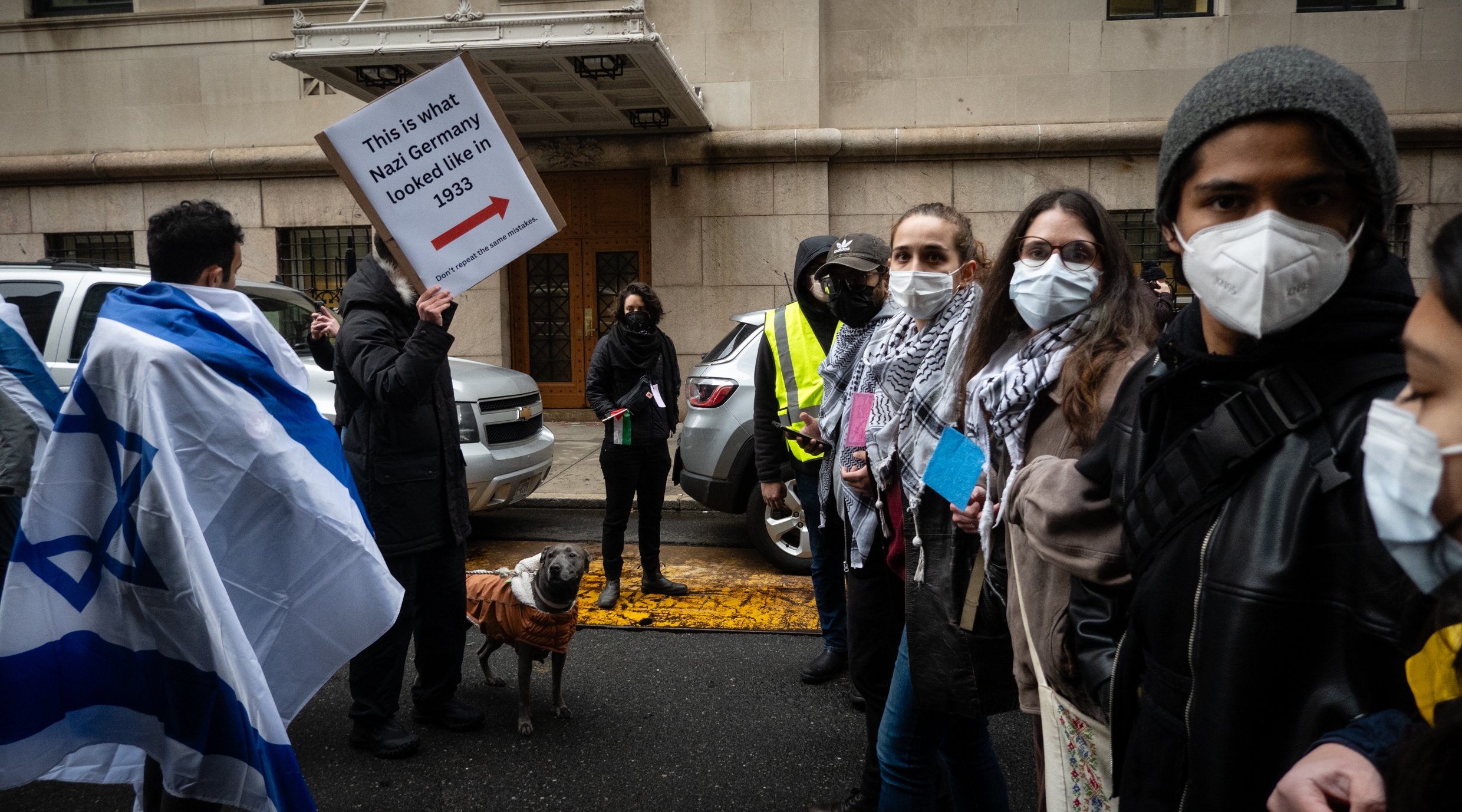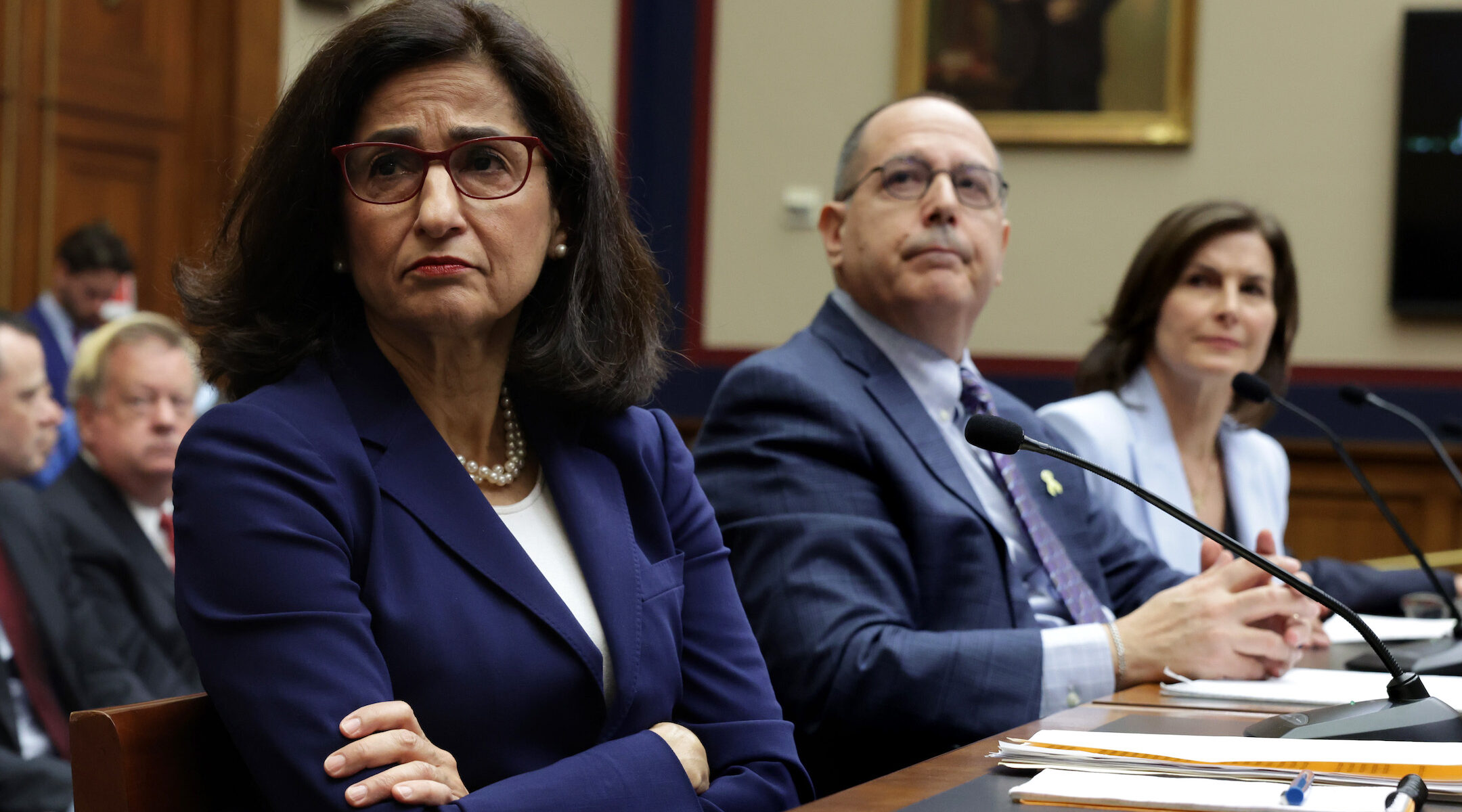(JTA) — When the question came, Columbia University’s president was ready. Her answer was “Yes.”
Just minutes into a congressional hearing on campus antisemitism on Wednesday, Nemat Shafik had been asked, “Does calling for the genocide of Jews violate Columbia’s code of conduct?”
It was a knowing repeat of the now-infamous question that cost the presidents of Harvard and the University of Pennsylvania their jobs. When those two leaders faced the same House panel in December amid rising antisemitism on their campuses, they hedged in their answers. This time a Democrat, Oregon Rep. Suzanne Bonamici, posed the question, defanging it before it could be claimed by Republican Rep. Elise Stefanik, who posed it in December.
Shafik, who assumed the presidency days before the Oct. 7 Hamas attacks, avoided the December hearing owing to her travel schedule. On Wednesday, she and her three co-panelists — two of whom are Jewish and all of whom are in positions of senior leadership at Columbia — answered in the affirmative.
Their responses led one Republican to sarcastically congratulate them on “beating” Harvard, Penn and the Massachusetts Institute of Technology, whose president also spoke at the last hearing.
The exchange demonstrated how the discourse on campus antisemitism has changed since the December hearing — as well as how Shafik aimed to distinguish herself from the three university presidents who testified then. Columbia, like other schools across the country, has had a volatile climate surrounding the Israel-Hamas war (as Shafik prepared to testify, competing pro-Palesitinan and pro-Israel protests were taking shape on campus).
But over the course of the hearing, Shafik pointed to actions she’s taken to curb antisemitism, such as suspending pro-Palestinian student groups; agreed that some professors had crossed the line with their rhetoric; and in general avoided the kinds of viral stumbles that doomed her counterparts at Penn and Harvard.
“One of the things I’ve said over and over is that antisemitism isn’t a problem for Jewish people to solve,” Shafik said. “It’s actually a problem for all of us.”
Shafik’s effort to show that she was on top of the issue was countered at times by Republicans and a few Democrats. They instead sought to advance the narrative that Shafik and her leadership had been negligent in their handling of antisemitism on campus since the outbreak of the Israel-Hamas war.
“You have no action, no disciplinary action,” Stefanik told Shafik, accusing her and Columbia of being too lenient on faculty who have made comments supporting the Oct. 7 attacks. Hearing that one of the disciplinary steps taken against Joseph Massad, a professor who praised the Hamas attacks, included a stern discussion, Stefanik added, “Speaking to these professors is not enough. And it’s sending a message across the university that this is tolerated, these antisemitic statements from a person with a position of authority in this classroom is tolerated.”
Shafik and the other administrators said they would not grant Massad tenure today knowing his history of praising groups like Hamas.
Shafik addressed a series of contentious questions surrounding the Israeli-Palestinian campus debate. She called various pro-Palestinian chants “incredibly hurtful” and “upsetting,” including “From the river to the sea, Palestine will be free,” which many Jews interpret as calls for violence against them.
She hedged on the campaign to boycott Israel, calling it “a political movement,” as well as on the term “globalize the intifada,” which she said “some people don’t” hear as antisemitic.
And she defended the school’s course offerings on Israel and Jewish history by pointing to its academic partnership with the Jewish Theological Seminary, a Conservative Jewish institution that runs an undergraduate college whose students study at Columbia.
She stated that faculty on campus who have praised Hamas since Oct. 7, as well as at least one pro-Israel faculty member — outspoken university critic Shai Davidai — are currently under investigation, and that several students have been disciplined or suspended for participation in antisemitic and harassing incidents.
Democratic Rep. Ilhan Omar, a prominent critic of Israel, asked Shafik directly about attacks from Davidai, a business school professor who has condemned the university since shortly after Oct. 7 for not doing enough, in his view, to protect Jewish students. Pro-Palestinian students have accused him of targeting them.
“As president, I’m used to being attacked,” Shafik responded. “But attacking our students is unacceptable, and in that case, we’ve had more than 50 complaints about that professor.”

Pro-Palestinian and pro-Israel demonstrators square off outside Columbia University, Feb. 2, 2024. (Luke Tress)
On X, formerly Twitter, Davidai accused Shafik of lying.
“The President of Columbia knows for a FACT that I’ve never attacked any of our students,” he wrote. “She knows I have been only speaking out against pro-Islamic Jihad organizations, their radical leaders, and terrorist-loving professors. She lied under oath.”
Shafik also highlighted measures Columbia has taken to try to curb antisemitism on campus, including restricting non-student access to campus, and suspending the anti-Zionist groups Jewish Voice for Peace and Students for Justice in Palestine when they failed to follow rules governing student protest on campus.
“I think that was a very powerful symbol, to say if students don’t abide by the rules there will be consequences,” she said about the suspensions.
Still, Shafik and the other panelists — Columbia antisemitism taskforce co-chair and former law school dean David Schizer, and board of trustees co-chairs David Greenwald and Claire Shipman — acknowledged that antisemitism has been a problem on campus and they have more work to do to fix it.
At various times, Stefanik — a Donald Trump ally who became an unlikely hero to many Jews after her December grilling of the university presidents — tried to catch Shafik in the act of changing her testimony.
After Shafik stated that she has not seen any campus protests “against Jewish people,” in the words of Omar, Stefanik pushed her on whether she believed that various chants caught on tape at campus protests, including “F–k the Jews,” were antisemitic. Other Republicans questioned Columbia’s commitment to diversity by suggesting that pro-Israel students were repressing their views.
Holding up a dog tag, which pro-Israel activists have taken to wearing to signify the plight of Israeli hostages in Gaza, Republican Rep. Tim Walberg of Michigan suggested that, as a student, he might have to “quietly take it off so my professor wouldn’t see it, a professor who holds my academic career in the palm of his hands. That’s free speech? That’s diversity?”
Other lawmakers, including Michigan Rep. Haley Stevens, a Democrat, also cited the Anti-Defamation League’s recent “D” grade for Columbia’s approach to antisemitism — in a report card released by the antisemitism watchdog that many Jewish campus leaders have criticized as too blunt an instrument.
Brian Cohen, executive director of Columbia/Barnard College Hillel, attended the hearing and praised Columbia’s performance in an email to his community after it ended.
“The transparency demonstrated today by University leadership must continue,” Cohen wrote. But, he added, “We should not need a Congressional hearing to know that the University is holding accountable those members of the community who violate policies and that the University is ensuring that Jewish students ‘can continue in their academic pursuits without fear for their personal security or other serious intrusions on their ability to teach and to study.’”
The hearing came during a particularly sensitive moment for Columbia, which has faced multiple Title VI discrimination investigations and lawsuits over how it has addressed activism surrounding Israel.
One of those lawsuits was referenced during the hearing: an anonymous Israeli student sued the university for suspending and publicly reprimanding him after he sprayed pro-Palestinian protesters with what Shafik referred to as “an odorous substance.”
At times, some representatives suggested that protests at Columbia may have especially high stakes. Quoting a passage from the Bible about the “covenant” between God and Israel, Georgia Rep. Rick Allen asked Shafik whether allowing negative dialogue about Israel at the university would set them on a path to damnation.
“Do you want Columbia University to be cursed by God?” the Republican asked.
“Definitely not,” Shafik replied.
Jackie Hajdenberg contributed reporting.
JTA has documented Jewish history in real-time for over a century. Keep our journalism strong by joining us in supporting independent, award-winning reporting.






